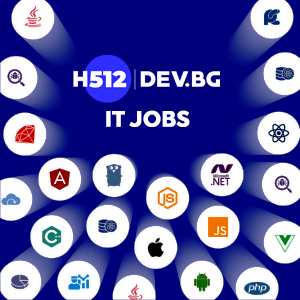Last year we witnessed not only multi-million investments in domestic IT companies, but also a number of mergers and acquisitions (M&A) in the sector, which affected the career opportunities and the job board of H512.com. Although the global market for M&A deals has shrunk substantially, experts believe that consolidation in the industry has not reached its limit. It will continue in 2024 and in Europe in particular, which in the third quarter of last year convincingly surpassed the US in terms of technology M&A volume, according to a report by analyst firm CB Insights, with our country also being part of the process.
M&A success of Bulgarian companies
The industry started the year on a high note with three major deals. In January, IoT solutions and home products provider Allterco Robotics (now Shelly Group) finalised the first stage of its acquisition of Slovenian company GOAP, buying 60% of the capital of the smart home device manufacturer for €2m. The deal will allow Allterco to enter new markets and expand its technology portfolio for end-user and professional customers, and if it also acquires the remaining 40% held by individual shareholders, the total price could reach €5.5m.
Also in January, Trackerbot, Bulgarian e-commerce automation software for eBay and Amazon merchants, sold a majority stake to Quadra Group, a start-up investment company founded by entrepreneur Filip Prokopiev. The financial parameters of the deal were not disclosed. Trackerbot has over 8,000 users in more than 20 countries and continued to operate under the same name, and the deal will help it gain a foothold in new markets and grow its product line.
Two months later, Bianor Holding began an annual “hike” for business acquisitions. In March, it bought Bulgarian ITIDO, a developer of web and mobile products, and Databreathe, a data analytics and artificial intelligence company. The two companies retained their brand, management and team and operate as subsidiaries within the holding company, and their acquisition will help it diversify its clients and projects into defence and data processing. In the summer, the holding raised BGN 8 million from the Bulgarian Stock Exchange, and in September it acquired 100% of Bulgarian software company GotoAdmins, which specialises in DevOps, cloud migration and management, and digital transformation. GotoAdmins has also continued to operate as an independent company, and the acquisition has expanded the group’s capacity, expertise and service offering. At the end of the year, Bianor also acquired 100% of the capital of Bulbera, a Bulgarian telecommunications, healthcare and e-commerce software solutions company with offices in Stara Zagora and Veliko Tarnovo, which will enable the holding company to expand beyond the capital. The value of all four deals was not disclosed and their aim is to help Bianor “become the Bulgarian public IT group with the highest market capitalisation”.
In the summer, Bulgaria-based 3D visualisation company Chaos acquired Italy’s AXYZ design for an undisclosed sum. The anima 5 software developed by AXYZ design offers fast incorporation of moving 3D/4D human figures into architectural visualizations and features over 2,500 scanned realistic images of people, and Chaos plans to integrate it into its own products (V-Ray, Corona, etc.). The acquisition of AXYZ design is the fourth strategic move of Chaos’ expansion, which began in 2022. It then merged with Enscape, a German real-life rendering and design technology company, and acquired Cylindo, a Danish 3D product visualization platform, as well as CGarchitect, a hub for those working in architectural visualization. Today, Chaos is the largest global 3D visualization company headquartered in Karlsruhe (Germany) and with over 700 employees in Bulgaria, Germany, Czech Republic, North Macedonia, Denmark, UK, USA, South Korea and Japan.
International players that acquired (part of) domestic IT companies
Four years after its establishment, the fintech Phos, which has nearly 30 employees in Bulgaria, was acquired by the French company Ingenico, the value of the deal was not reported. Phos operates in the SoftPoS solutions market, which allows small merchants to accept digital payments via mobile devices, and Ingenico is a global leader with a 45-year history in PPaaS payments. The deal will help Ingenico expand its market share, given that the number of SoftPoS terminals globally is expected to grow from 3.1 million in 2022 to 12 million in 2027.
In March, Canadian e-commerce company Brio Commerce acquired Bulgarian startup Vanga AI just 18 months after its birth. Vanga AI helps create online businesses by automating sales and scaling them using artificial intelligence. The price of this deal also remained confidential and is part of Brio Commerce’s growth strategy in offering e-commerce tools for online merchants to optimize their sales and marketing activities.

Two months later the Bulgarian e-commerce solutions start-up AIOPSGROUP, which has over 150 employees in Bulgaria, was acquired by the German Valantic, a leading company in the field of digital transformation. AIOPSGROUP became a multi-million dollar business in just over two years and its clients include brands such as Puma and Rossignol. The price of the deal was not reported. Valantic will expand its e-commerce presence in Europe, aiming to become the largest CX provider in the region, and AIOPSGROUP will contribute its expertise in B2B and B2C e-commerce solutions.
In September, Estonian strategic change and technology company Nortal announced that it was acquiring Bulgaria’s Questers, a subsidiary of UK-based TPXimpact Holdings with over 300 employees in the country, for €8.5m. Questers will merge with Nortal’s software services outsourcing subsidiary pwrteams, strengthening the Estonian developer’s position in the US and UK, as well as its business of setting up cross-border IT and engineering teams for clients around the world.
Institutional players have also joined the acquisition of Bulgarian technology companies in 2023. At the beginning of the year, the European Bank for Reconstruction and Development (EBRD) took a minority stake in semantic technology company Ontotext – 17.51% of shares for €6.96m. Recall that in 2022 the funds Integral, Carpathian Partners and PortfoLion Capital Partners acquired the majority stake in Ontotext from Sirma Group Holding. In this year’s deal, EBRD is a direct investor, while the other investors are a subsidiary of PortfoLion (a stake of just over 5% for €2m) and Atanas Kiriakov, the founder of Ontotext (a stake of 1.26% for €500k), who remains with the company in a management role.
In June, European fund CEECAT Capital acquired almost 23% of the capital of systems integrator Telelink Business Services (TBS) during an auction in which the company’s largest shareholders offered 25% on the Bulgarian Stock Exchange. CEECAT bought 2.872 million shares at a price of BGN 9.5, or a total of BGN 27.3 million. An official press release from the fund said that “CEECAT will work with TBS to continue the company’s sustainable development, talent attraction and strategic global expansion with a focus on Western Europe and the US.”
At the end of the year, US investment fund Advent International launched Circle, a payments and technology platform serving small and independent merchants in Europe. As part of its growth strategy, it announced it would buy payment solutions provider myPOS. The fintech was founded in 2012 by Hristo Georgiev, has over 350 employees in Bulgaria and its products are used by nearly 170,000 merchants in Europe. The deal is expected to happen any moment and is worth around €500m.
Global M&A deals with local significance
US-based Progress, which has over 600 employees in Bulgaria, acquired MarkLogic, a company specialising in complex data management and meta data, for $355m in early 2023. In doing so, it will expand its portfolio of application development, deployment and management products, adding an easy-to-integrate semantic database platform.
US IT company with Ukrainian roots SoftServe, which has nearly 600 employees across four offices in the country, has acquired mobile and web solutions digital agency Hoverstate. The value of the deal was not announced, and two months ago the company opened an office in Romania (Bucharest) with the ambition to create 800 jobs by the end of 2025.
In June, Irish group CluneTech, which has nearly 900 employees in Varna, Veliko Tarnovo and Shumen, sold technology company Immedis to US HR technology provider UKG for more than €500m. Immedis has a 250-strong team in the country and UKG plans to expand its presence here.
A month later, Finnish tech company Tietoevry acquired MentorMate from Taylor Corporation, which bought it in 2014. The value of the deal was not announced. MentorMate has over 850 employees in five locations across the country and currently has over 40 open positions on H512.com’s job board.
In August, Insight Enterprises, a Fortune 500 solutions integrator, acquired UK software company Amdaris, and financial details of the deal were not disclosed. The Sofia office of Amdaris employs 50 people, and the company is expected to soon expand to two more locations – Varna and Plovdiv.
In the same month, French company Atos sold its outsourcing services unit and renamed itself Eviden. The French IT giant continues to experience financial difficulties and is currently in talks with Airbus to acquire its cybersecurity unit. All these changes are likely to affect Bulgaria, where Atos has nearly 1,700 employees.
The last quarter of the year continued to be intense, with news revolving mainly around Software AG and VMware. In October, private equity fund Silver Lake Management acquired Software AG for nearly €2.2 billion. The German product company has been around since 2006, has a team of 300 and has yet to expand its presence in the US, and in December IBM said it would acquire its StreamSets and webMethods technology platforms for €2.13bn.
The news that US semiconductor maker Broadcom is acquiring VMware has caused the biggest stir in Bulgarian IT circles, as the cloud computing and virtualisation company has over 1,700 employees in the country. The entire $69 billion deal and all approvals took 18 months.
However, the IT job market remains promising given the new tech players that have chosen Bulgaria in 2023 (we’ll tell you more about them later) and the 2,170+ open positions on H512.com’s job board for any talent looking for meaningful fulfillment and career development.


 Publish date: 12 January, 2024
Publish date: 12 January, 2024


 Sofia
Sofia